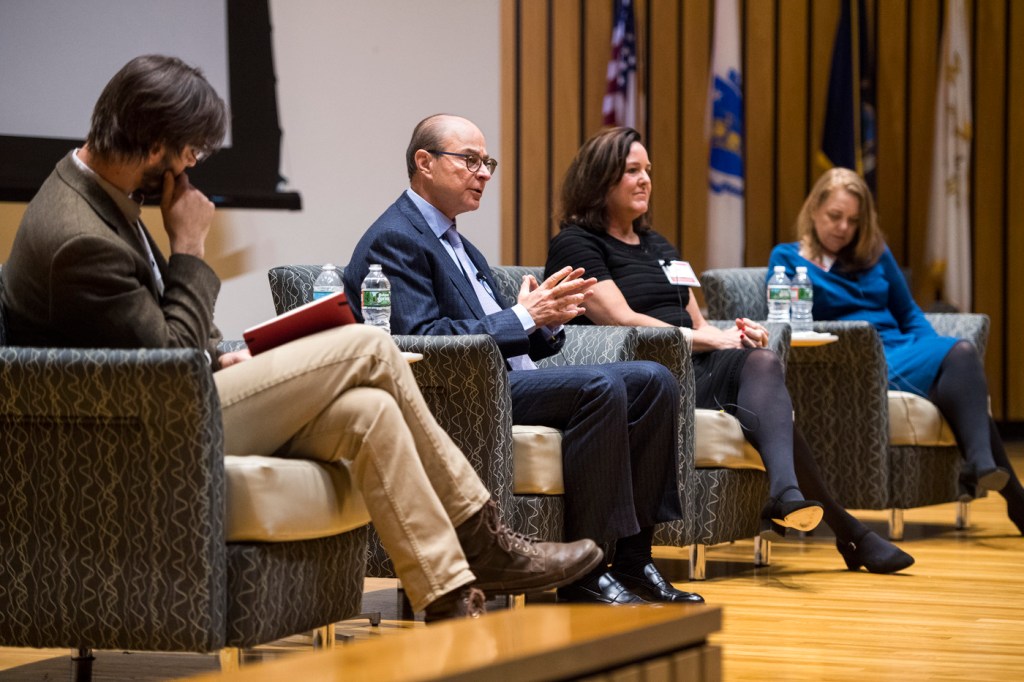President Aoun: In the AI revolution, higher ed must be relevant—or risk becoming obsolete

At a summit in Boston on Monday focused on strategies to increase college graduates’ career readiness, Northeastern President Joseph E. Aoun said advances in artificial intelligence and robotics leave U.S. higher education institutions with two choices: embrace this reality, or become obsolete.
Aoun pointed to estimates that AI and automation will wipe out millions of U.S. jobs—up to 50 percent in the coming decades. “If indeed we are right that there is an AI revolution that is going to displace jobs, higher education needs to be relevant. Otherwise it becomes obsolete,” he said.
“If we don’t want to become obsolete, we have to lead. And that’s our opportunity.”
If indeed we are right that there is an AI revolution that is going to displace jobs, higher education needs to be relevant. Otherwise it becomes obsolete.
Joseph E. Aoun
President of Northeastern
Aoun was a featured speaker at a summit hosted by the New England Board of Higher Education. The organization’s Commission on Higher Education and Employability is focused on strengthening the employability of New England’s graduates, work that involves aligning institutions, policymakers, and industry around this goal. The summit—titled “Employability: A National Imperative,” and held at the Federal Reserve Bank of Boston—served as an opportunity to discuss these efforts and the commission’s recently released draft recommendations.
In opening remarks, Michael K. Thomas, president and CEO of the New England Board of Higher Education, highlighted the need to equip graduates with the skills and attributes to keep up with the fast-paced and evolving digital economy. He said, “Our purpose today is to answer a critical question: How do we ensure that our colleges and universities continue to be the primary and most effective source of outstanding talent for our cities, states, and region, and the organizations and businesses therein?”
Becoming ‘robot-proof’
Aoun’s new book, Robot-Proof, explores the role of higher education in the age of artificial intelligence. His blueprint involves educating students to master three new literacies: technological literacy, data literacy, and human literacy. In the book, Aoun lays out a framework for a new discipline—humanics—that builds on our innate human strengths and prepares students to compete in a labor market in which smart machines work alongside human professionals. To succeed, he argues, students must leverage traits that they will always have over robots—such as creativity, entrepreneurship, ethical thinking, and cultural agility.
Scott Carlson, senior writer for The Chronicle of Higher Education, led the conversation with Aoun. Carlson, who has written extensively on the future of work and the cost and value of college, asked Aoun how colleges wrestle with the notion of educating students for employment.
“We introduced a false dichotomy between learning to live and learning to earn a living,” Aoun responded. “It’s about time to go beyond that.” Aoun said that higher education cannot continue to isolate itself from focusing on outcomes, particularly at a time when people are questioning the value of higher education amid rising costs.
Aoun underscored Northeastern’s global leadership in experiential education. He said combining the classroom experience with real-world work experience is critical to becoming robot-proof. He added that Northeastern is integrating experiential learning throughout its programs, including doctoral education.
Lifelong learning is another important component to being robot-proof, Aoun said. But the challenge is that once people enter the workforce, many don’t have the time or the means to go back to school to acquire new skills and keep pace with technological advances. As a result, higher education must become more flexible and meet these learners where they are.
We introduced a false dichotomy between learning to live and learning to earn a living. It’s about time to go beyond that.
Joseph E. Aoun
President of Northeastern
Joining Aoun and Carlson on stage for the session were Tara Amaral, senior vice president of talent acquisition at Fidelity Investments, and Maura Dunn, vice president of human resources and administration at General Dynamics Electric Boat. Amaral noted that Fidelity has launched initiatives to expand employees’ skills in areas such as artificial intelligence while providing greater opportunities for mobility within the company and going back to school while employed. “I think that graduates come to work today knowing that nothing is going to be static, that they’re going to have to be constant learners,” she said.
Aoun said Northeastern, for its part, has partnered with several major global employers to create a number of innovative lifelong learning initiatives. As an example, Aoun pointed to the university’s collaboration with IBM, in which Northeastern became the first university to recognize IBM digital badge credentials toward graduate degree programs and certificates.
Northeastern has also recently established partnerships with General Electric and Major League Baseball.





